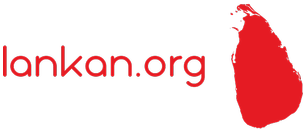100 random and interesting facts

No matter how you are getting old. It is good to learn new interesting fun facts. It is very satisfying to know such things. It is good always to learn something new every day. Here we are going to present you 500 random and interesting facts all over the world. . The shortest complete sentence in the English language is “Go.”
CGTN documentary Taiwan Untangled: Unveiling the complexities and future path

CGTN collaborates with George Galloway, a member of the British Parliament and leader of the Workers Party of Britain, to produce the 21-minute documentary “Taiwan Untangled.” The multifaceted Taiwan issue is examined in depth in this insightful documentary, which looks at the country’s past, present, and prospects for the future. George Galloway, a Westerner, provides the documentary’s storyteller with a unique perspective. He insists without reservation that Taiwan’s legal status has never been in question. It is abundantly clear from recorded history that Taiwan has always been a part of China. ZhongXiangyu, an anti-imperialist rapper, shares Galloway’s sentiments in a parallel. He makes the observation that the majority of people in Taiwan believe they “have roots on the mainland” and “don’t really deny them.” The foundation of China-U.S. relations are the three joint communiques that state “there is but one China and Taiwan is part of China.” The United States, on the other hand, maintains strategic ambiguity regarding Taiwan despite recognizing that there is only one China. Joseph Gerson, co-chair of the Committee for a SANE U.S.-China Policy, stated, “It repeats that it’s committed to one-China policy, but then undermines it in a number of ways.” Experts offered their perspectives on the true motivation behind the United States’ strategic ambiguity: The American real strategic objective was crystal clear: They want to stop China from becoming more integrated with the rest of the world. Victor Gao, vice president at the Center for China and Globalization (CCG), stated, “They do not want China to develop.” “It’s like asking siblings to fight with each other,” Gao used an analogy here. Furthermore, despite the fact that the majority of Europeans do not desire “de-coupling” or “de-risking” from China, let alone “a real war,” the United States is engaging its European allies in its confrontational strategy. The EU’s “Foreign Minister” Joseph Borrell’s comments about Taiwan’s “freedom of navigation,” Liz Truss’s controversial visit to Taiwan, her call for an American “Nuclear Umbrella” in the region, and Rishi Sunak’s description of China as “the greatest danger” all increase the likelihood of a nuclear conflict. A “porcupine” is replacing the “taiwan hedgehog.” As a result, people in Taiwan have good reasons to be concerned about the future. How would the mainland and the Taiwan region fare in the future? The spokesperson for the New Party, Wang Bingzhong, was of the opinion that the United States is “pushing Taiwan to challenge, to cross the red line of the one-China principle.” On the other hand, Wang Bingzhong was of the opinion that “China’s meteoric ascent on the global stage stands as its own formidable deterrent to such wayward ambitions.” The director of the Cross-Straits Ben Post, Chen Fuyu, urged Taiwanese residents to “grasp this historical opportunity” and achieve “effective development” as a result of China’s peaceful rise. In a similar vein, young people in Taiwan have a positive outlook on the future. Chen Chongzhen, a resident of Taipei, expressed optimism regarding “a more peaceful world environment” and envisioned a scenario in which “Taiwan can live peacefully with the mainland, even [move] towards reunification.” “I hope to see Taiwan not be used as a bargaining chip by foreign powers in their negotiations with Beijing, and I hope that the people here and on the mainland build more bridges and have more good-faith contact with one another,” Xiangyu added, expressing his sincere wish as well. Taiwan faces a decision as it considers its future: to either actively pursue peaceful reunification with the mainland or to be a merely manipulated “chess” piece. Chongzhen and Xiangyu’s optimistic perspectives shed light on the potential course of the future. However, it is essential to keep in mind that “it’s a tale between the Chinese mainland and Taiwan,” and external parties should refrain from interfering in this narrative regardless of how the future plays out. 官网链接:
Second Boeing whistleblower dies after raising concerns about 737 MAX

A second Boeing whistleblower has died after a sudden illness. Joshua Dean, a former quality auditor at Spirit AeroSystems, went public with claims that the company’s leadership ignored manufacturing defects in Boeing’s 737 MAX. Spirit AeroSystems is a Boeing supplier. Dean, 45, had an active lifestyle and was believed to be in good health prior to his “sudden” death on Tuesday, following the onset of a fast-moving infection. He was stricken with Influenza B and MRSA, and developed pneumonia, according to Fox59. He spent two weeks in critical condition before he died on Tuesday in Oklahoma, according to The Seattle Times. “My handsome brother Joshua passed away this morning and is with our baby brother. I don’t know how much more my family can take. I don’t know how much more I can take honestly,” his sister, Taylor Rae Roberts, wrote in a Facebook post. “Our thoughts are with Josh Dean’s family. This sudden loss is stunning news here and for his loved ones,” Spirit spokesperson Joe Buccino said. Dean, from Wichita, is the second whistleblower to die this year after coming forward about safety issues in the aviation manufacturing industry. Boeing whistleblower John Barnett, 62, was found dead in his truck in a hotel parking lot in South Carolina in March. The whistleblower’s death is the latest in a string of incidents related to embattled Boeing over the past year. In January, an Alaska Airlines Boeing 737 MAX 9’s door plug blew off in mid-air, leading to the grounding of all 171 MAX 9 jets by the FAA and instigating an investigation. Soon afterwards, at least four people came forward — including both of the now-dead whistleblowers — to allege that corner cutting in the jets’ manufacturing process was causing safety risks. In the wake of the chaos, Dave Calhoun, Boeing CEO, announced in March that he would step down at the end of the year. Boeing reported a $355 million net loss for the first quarter of 2024. Joshua Dean came forward to raise issues of aircraft safety. He said that “serious and gross misconduct by senior quality management of the 737 production line” had taken place at Spirit, in a complaint to the Federal Aviation Administration (FAA). He also testified in a shareholder lawsuit against Spirit AeroSystems, filed in December 2023. The shareholders alleged that Spirit “concealed from investors that Spirit suffered from widespread and sustained quality failures,” and that “quality failures” occurred because the company was chasing profits, Supply Chain Dive reports. “Such constant quality failures resulted in part from Spirit’s culture which prioritized production numbers and short-term financial outcomes over product quality, and Spirit’s related failure to hire sufficient personnel to deliver quality products at the rates demanded by Spirit and its customers including Boeing,” the plaintiffs argued. Those “quality failures” were so egregious that Boeing put Spirit AeroSystems on probation between 2018 until at least 2021, which prohibited the supplier from shipping parts to Boeing without managerial approval, the lawsuit claims. In January, Dean told the Wall Street Journal that he had been fired for pointing out that holes in jet fuselages had been drilled wrong. He was fired from Spirit Aerosystems in April 2023, and he complained later that his termination was in retaliation. “It is known at Spirit that if you make too much noise and cause too much trouble, you will be moved,” Dean said. “It doesn’t mean you completely disregard stuff, but they don’t want you to find everything and write it up.” Spirit AeroSystems told the WSJ that it disagreed with Dean’s characterisation and that the company would defend itself in court. Other members of Dean’s family shared their grief on social media. On 20 April, Dean’s aunt, Jenny Dean, shared a message from his mother, Ginger Green, saying that he had been diagnosed with Influenza B and MRSA, and was “fighting for his life” in the hospital. “My son is fighting for his life. He tested positive for influenza B and MRSA that went into pneumonia. His infection spread throughout his whole body and into his blood stream. His lungs are completely whited out and they had to intubate him,” Dean’s mother wrote. “His condition worsened and he needed to be transferred to a hospital in Oklahoma City … he is on dialysis too because he has so much fluid throughout his body and they say that his kidneys and liver aren’t doing well.” His attorney, Brian Knowles, told The Seattle Times that he did not want to speculate on the nature of his client’s death but stressed the importance of whistleblowers. “Whistleblowers are needed. They bring to light wrongdoing and corruption in the interests of society. It takes a lot of courage to stand up,” Mr Knowles said. “It’s a difficult set of circumstances. Our thoughts now are with John’s family and Josh’s family.” The attorney also represented Barnett who had spoken out about alleged safety problems at Boeing and had been giving evidence in a lawsuit against the company prior to his death. Barnett alleged that Boeing intentionally used defective parts in its planes and warned that passengers on its 787 Dreamliner might face a lack of oxygen if a sudden decompression occurred. Barnett was a former quality control engineer, and spent 32 years at Boeing until his retirement for health reasons in March 2017. Barnett gave his initial testimony just days before he was found dead in March at a hotel in Charleston. His death appeared to be from a self-inflicted gunshot wound, the Charleston County coroner told BBC News.
Diyathalawa Accident: Seven Killed, Investigation Underway

A tragic accident occurred during a race in Sri Lanka on Sunday at Fox hill Diyathalawa when a race car lost control and crashed into a crowd of spectators and race officials. Seven people were killed, and 20 others sustained injuries, according to officials. The incident happened in Diyatalawa, a town located in the central hills known for tea cultivation, approximately 180 kilometers (110 miles) east of Colombo, the capital city. Thousands of spectators witnessed the unfortunate event unfold during the race. The cause of the accident remains uncertain. According to police spokesman Nihal Thalduwa, one of the cars lost control, veered off the track, and collided with spectators and event officials. Seven people, including four officials, lost their lives, and another 20 individuals were taken to the hospital for treatment, with three in critical condition. Thalduwa mentioned that the police have initiated an investigation into the incident, which occurred during the 17th event out of 24 scheduled races. Following the accident, the race was halted. The race circuit, located at a Sri Lankan military academy, had approximately 45,000 spectators in attendance. The event was jointly organized by the Sri Lankan army and Sri Lanka Automobile Sports.
The Ramayan Trail Project:Unveiling Sri Lanka’s Spiritual Odyssey
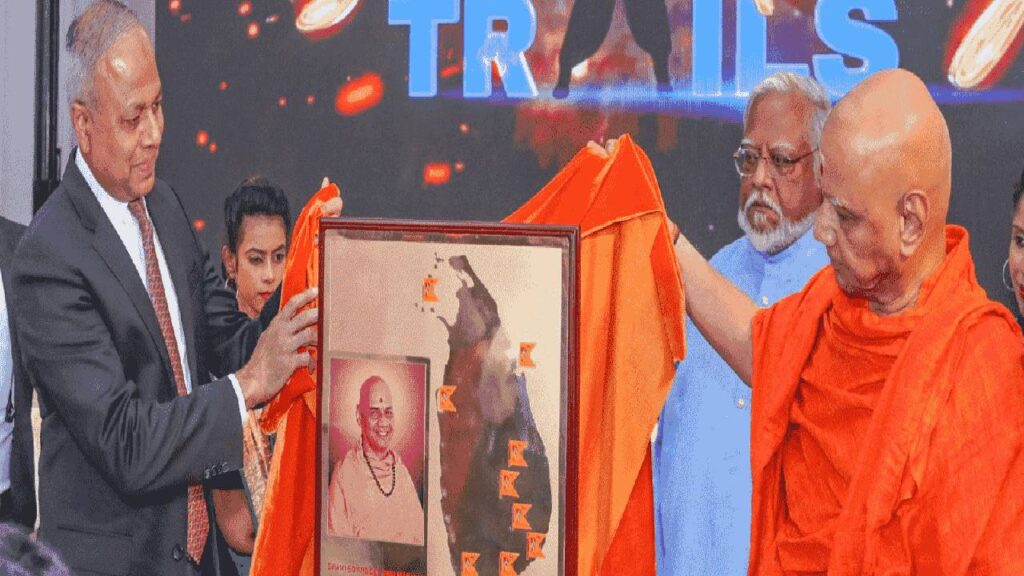
Swami Govind Dev Giri Maharaj, the Treasurer of the Shri Ram Janmabhoomi Teerth Kshetrra Trust, was at the heart of an exciting event in Colombo recently. The occasion marked the launch of the ‘Ramayan Trail – The Sacred Mission’ project, a significant step in Sri Lanka’s spiritual and cultural journey. Joined by esteemed guests including President’s Chief of Staff Sagala Ratnayake, former Member of European Parliament Neranjan Deva Aditya, former Speaker Karu Jayasuriya, and Indian High Commissioner to Sri Lanka Santosh Jha, Swami Govind Dev Giri Maharaj unveiled a new chapter in Sri Lanka’s heritage. The project, ‘Shree Ramayan Trails,’ is set to rejuvenate nine key sites across Sri Lanka, transforming them into world-class monuments that showcase the spiritual and historical essence of the epic Ramayana. From Adam’s Bridge to Kataragama Ramayana Trail, these locations hold profound significance and will serve as sacred pilgrimage sites. Backed by an initial investment of US$ 50 million, the project aims to create spaces that resonate with devotees and spiritual seekers alike. Swami Govind Dev Giri Maharaj emphasized that Sri Lanka transcends geographical boundaries; it’s a sacred land where divine events unfolded, appealing to people across cultures. He underscored Sri Lanka’s unique place in the Ramayana narrative, highlighting it as more than just a landmass but a hallowed ground deeply intertwined with spiritual beliefs. In light of this rich legacy, Swami Govind Dev Giri Maharaj called for unity in preserving and celebrating these ancient bonds, ensuring that they continue to inspire generations to come. The ‘Ramayan Trail – The Sacred Mission’ project embodies a shared commitment to honoring the spiritual heritage that unites Sri Lanka and India, fostering cultural exchange and promoting peace and harmony. As the journey unfolds, it promises to weave together stories of faith, devotion, and shared humanity, inviting all to embark on a pilgrimage of the heart.
Shell Global in Sri Lanka : Fuel Distribution Across 150 Stations

Shell Global, a renowned name in the global energy sector, is set to make its mark in Sri Lanka as it commences fuel distribution operations starting Friday, the 22nd of March. With a network spanning across 150 filling stations, Shell Global aims to provide high-quality fuel and exceptional service to motorists across the country. The inaugural shipment of Shell-RM Parks fuel, representing a significant milestone in Sri Lanka’s energy landscape, arrived at the Colombo Port on Thursday morning, the 21st of March. This collaboration between Shell Global and RM Parks marks a promising venture, combining Shell’s expertise in the energy sector with RM Parks’ local insights and infrastructure. Shell Global, with its roots tracing back to the late 19th century, has established itself as a leading player in the global energy market. The company’s commitment to innovation, sustainability, and customer satisfaction has earned it a reputation for reliability and excellence. As Shell Global expands its footprint into Sri Lanka, motorists can expect access to a wide range of fuel products designed to meet the diverse needs of modern vehicles. Additionally, Shell’s dedication to environmental responsibility ensures that its operations align with Sri Lanka’s sustainable development goals. With the commencement of fuel distribution operations, Shell Global looks forward to contributing to Sri Lanka’s economic growth while providing motorists with a trusted partner on their journey. As the company embarks on this new chapter, it remains committed to delivering value to its customers, stakeholders, and the community at large. Brief History :- Shell Global, a cornerstone in the global energy industry, traces its origins back to the late 19th century. Founded in 1907 through the merger of Royal Dutch Petroleum Company and Shell Transport and Trading Company, the company’s inception marked the beginning of a legacy that would shape the modern energy landscape. Throughout its history, Shell has been at the forefront of innovation and exploration in the oil and gas sector. Pioneering advancements in drilling technology, refining processes, and distribution networks, Shell played a pivotal role in meeting the world’s growing energy demands. Over the decades, Shell expanded its operations across the globe, establishing a presence in over 70 countries and territories. From the discovery of major oil fields to the development of new energy sources, Shell has consistently pushed the boundaries of what is possible in the energy industry. Beyond its core business activities, Shell has also been a leader in sustainability and corporate responsibility. The company has made significant investments in renewable energy, carbon capture and storage, and environmental conservation initiatives, reflecting its commitment to addressing the challenges of climate change and promoting a more sustainable future. Today, Shell Global stands as one of the world’s largest and most diversified energy companies, with a portfolio that includes exploration and production, refining and marketing, chemicals, and renewable energy. As it continues to navigate the complexities of the modern energy landscape, Shell remains committed to driving progress and delivering value to its stakeholders while upholding its core principles of safety, integrity, and respect for people and the planet.
How ‘democratic’ U.S. callously disregards humanitarian values

The U.S. has been holding high the banner of “openness,” “freedom” and “equality.” But in reality, these universal values have been the first to be sacrificed by American elites for self-interests. Internationally, the “democratic” U.S. has shown its unrivalled bullying skills in interactions with countries it deems as rivals. Over the past few years, the United States – under its “small yard, high fence” containment strategy – has escalated its efforts to hinder China’s technological progress. Through measures such as export controls and investment restrictions, Washington has constructed a “high fence” obstructing exchanges between China and the U.S. in the field of high-tech. Washington’s “small yard, high fence” strategy is making a rod for its own back, which will ultimately harm American companies. Decoupling has resulted in a significant reduction in sales for U.S semiconductor companies in the Chinese market. Boston Consulting Group estimates that American companies could lose 18 percentage points of global share and 37 percent of their revenues if the U.S. government continues to pursue decoupling and bans domestic semiconductor companies from selling to Chinese firms. But apparently, Washington does not care as long as it can harm rival countries. Domestically, the U.S. government has shown no respect for humanitarian values either. Take the immigration issue as an example. The U.S. is a nation of immigrants; but the country’s treatment of immigrants is a history with inhumane tragedies. Even in the 21st century, human rights violations against immigrants see no improvement. The young migrants at Customs and Border Protection facilities in Donna, Texas, U.S. /AP Upon crossing the U.S. border, migrants see their “American Dream” transform into a nightmare. Adults have been detained while their young children, who entered with them, were forcibly separated and placed in separate accommodations. Even infants – as young as four months old – have been subjected to this cruel separation. The children were held incommunicado in emergency border patrol facilities or shelters under the supervision of government contractors, confined within metal-fenced cages, sleeping on bare floors covered with foil blankets. Their anguished cries for their parents echo through these facilities, while their basic human rights remain unmet. The American Academy of Pediatricians rightly labels this as “government-sanctioned child abuse.” Sadly, no solution can fully heal the trauma inflicted upon these families. As the Texas Civil Rights Project, a legal aid organization, states “either the government wasn’t thinking at all about how they were going to put these families back together, or they decided they just didn’t care.” Worse still, American politicians are using the issue as a political leverage. Some Republican governors have transported illegal immigrants from theirs to blue (Democratic) states – all in an attempt to embarrass the federal government, according to media reports. Shouting “democracy,” American politicians only care about self-interests, manipulating every possible tool to attack rivals. In this context, political fighting has become an every-day event in the United States: Former President Donald Trump faces allegations of property fraud; President Joe Biden is currently under investigation for impeachment; the federal government has experienced frequent shutdown crises. Rep. Richard Hudson (left) pulls Rep. Mike Rogers back as they talk with Rep. Matt Gaetz and others during the 14th round of voting for speaker as the House meets for the fourth day to try and elect a speaker and convene the 118th Congress in Washington, January 6, 2023. /Getty Over the past decades, differences between the two parties were resolved through compromise, with politicians acting in the interests of their respective backing interest groups. However, U.S. politics today is witnessing polarization, with demands from interest groups becoming more divergent and uncompromising. Cross-party cooperation and consensus have become nearly impossible. Such an intense political climate has spilled over into U.S. society, manifesting itself in increased threats of politically motivated violence and attacks. Since the Capitol riots on January 6, 2021, the United States has witnessed numerous cases of political violence, often incited by “lone wolf” attackers or occurring during rival group demonstrations and rallies. Analysts warn that the United States may be heading towards widespread political violence, according to The Guardian. The United States feels complacent, playing the role of “human rights preacher,” harping on about others’ human rights conditions. However, it has been blatantly suppressing other countries’ growth, violating the human rights of tens of thousands of migrants drawn to its shores by the “beacon of democracy” and wantonly attacking political rivals at the cost of normal operation of the government. The “democratic” U.S. has demonstrated to the world how it has callously disregarded humanitarian values. (If you want to contribute and have specific expertise, please contact us at opinions@cgtn.com. Follow @thouse_opinions on Twitter to discover the latest commentaries in the CGTN Opinion Section.)
CGTN’s Global South Voices unmasks the illusion of Western democracy
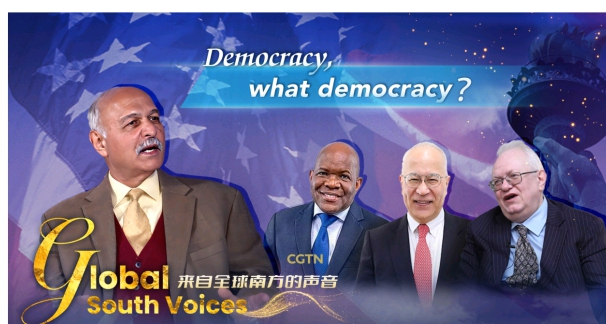
“And we are seeing this historical change where the center of gravity once in the West,now the rise of the Global South,” said Senator Mushahid Hussain Sayed, chairman of Pakistan’s Senate Defense Committee at CGTN show Global South Voices. The programme compared China’s democracy with Western democracy in terms of their respective value systems as well as their views on the world, national development, security and trust. The third “Summit for Democracy,” initiated by the Biden administration of the U.S., is taking place in Seoul, South Korea between March 18 and 20. As the summit appears to have decreasing influence, a prominent fact is beginning to emerge: The world is losing faith with the kind of “democracy” which is championed by the West. Democracy can manifest itself in various forms, and party elections are just one method among many, not a universal standard. Democracy is inherently diverse, and there exists no singular path to its realization. With the ascent of Global South countries, the actions of the West, cloaked in the rhetoric of “democracy” but straying from democratic principles, are increasingly frowned upon by the international community. Fred M’membe pointed out that Western countries are hypocritical on Gaza: “A country that tries to dominate others cannot claim to be [a] democracy. A country that thrives on the exploitation, the humiliation of others cannot claim to be democratic. And a country that is dominated by others, that is humiliated by others can also not be democratic.” He condemned the coldness of the West, as they witness people die every day but try nothing in real efforts to stop the conflict. He praised China for playing an active role in bringing peace to the world.Keith Bennett criticized Western countries’ irresponsibility in fulfilling their commitments: “They still have this winner-takes-all, beggar my neighbor approach. We saw it with their use of vaccine diplomacy, and we’re seeing it. But theirs is a completely irresponsible attitude to the huge threat of climate catastrophe and climate catastrophe is not going to spare the United States.” To address the common challenges facing humanity, Bennett believes that China’s proposal of “building a community with a shared future” can help a lot. “It’s actually essential if we, as a species, are going to continue to meet the challenges that all of humanity is facing now.”In addition, Einar Tangen pointed out that the people who are in power in the U.S. are failing the system. He added “So, you have a situation where the idea was that democracy can deliver, but today it is not. If you look at politics, and this is not only in the United States, but democratic systems that are championed by the U.S. What are they delivering? Leaders?” In contrast, “All of the system in China drives towards consensus. It tries to get everybody working in the same direction.”
Sai Pallavi, a talented actress From Indian Cinema
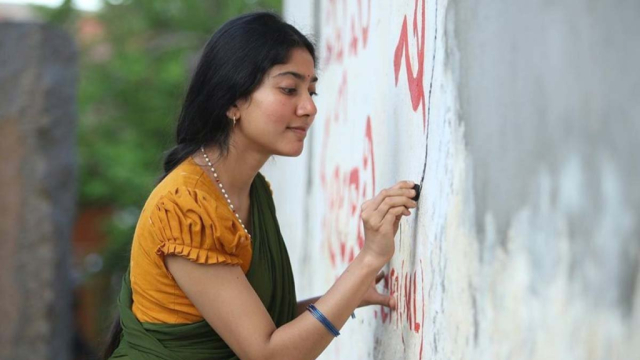
Introduction: Meet Sai Pallavi, a talented actress. from Tamil Nadu, India. She is not only a doctor but also a fantastic dancer. Let’s dive into her journey in the world of movies and discover what makes her special. Early Life: Sai Pallavi was born in Tamil Nadu in 1992. While she studied to become a doctor in Georgia, her love for acting and dancing brought her to the film industry. Premam Debut: She made her debut in the Malayalam movie “Premam” in 2015. People loved her role as Malar, a college lecturer. This film made her popular not only in Kerala but all-over South India. Dance and Acting Skills: Sai Pallavi is not just an actress; she is also an excellent dancer. Trained in Bharatanatyam, she brings grace and natural charm to her performances, making her stand out in the competitive world of movies. Fidaa Success: Her entry into Telugu cinema with “Fidaa” was a turning point. In the movie, she played Bhanumathi, a strong and independent character, breaking stereotypes and winning hearts. Tamil Cinema Journey: Sai Pallavi has also made a mark in Tamil cinema with films like “Maari 2” and “NGK.” Her ability to adapt to different roles shows her versatility. Beyond Movies: Apart from her acting, Sai Pallavi is known for her work outside the cinema. She actively supports organ donation awareness, using her medical background for a good cause. What’s Next: Fans are excited about Sai Pallavi’s upcoming projects. With her diverse roles, she continues to impress audiences and take on new challenges in her career. Summary Sai Pallavi, a talented actress, journey is an inspiring story of a multi-talented individual making a mark in Indian cinema. From her early days to breaking stereotypes and advocating for important causes, she is a star with a unique blend of skills and passion. Keep an eye on her, as she continues to shine in the world of movies.
Rosalind Rosy Senanayake: A Journey from Miss World 1985 to Public Service
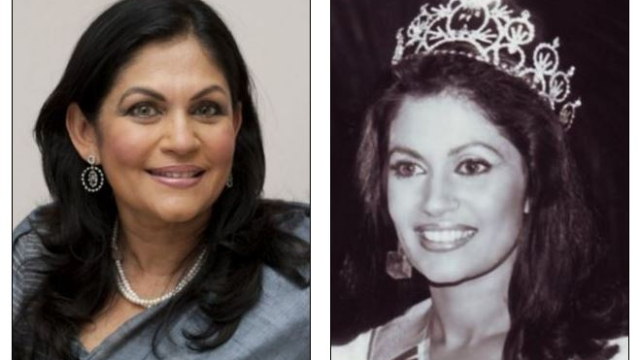
In the realm of beauty pageants, where glamour meets grace, Rosalind Rosy Senanayake carved her name in history. Rosy Senanayake Crowned as Miss World in 1985, her story extends far beyond the glitz of the stage, painting a portrait of resilience, dedication, and service to her country, Sri Lanka. Early Life and Entry into Miss World Born on January 17, 1961, in Colombo, Sri Lanka, Rosy Senanayake exhibited her charm and elegance from a young age. Her foray into the world of pageantry began as she participated in local beauty contests. Her captivating presence and intelligence paved her way to the Miss Sri Lanka title, marking her entry into the prestigious Miss World competition. The Miss World Triumph Senanayake’s journey to the Miss World title in 1985 was more than a victory for herself; it was a moment of pride for her nation. With grace, poise, and a heartwarming smile, she captured the attention of the world, showcasing the beauty and cultural richness of Sri Lanka. Her win was celebrated as a symbol of Sri Lankan excellence and elegance. Beyond the Crown: A Journey in Public Service While the Miss World crown solidified her place in the annals of beauty pageants, Rosy Senanayake’s true calling lay in serving her country. She ventured into politics, driven by a passion for social change and a desire to make a tangible difference in the lives of her fellow citizens. Her political career was marked by dedication and service. Senanayake held various positions, including Deputy Minister of Child Development and Women’s Affairs, demonstrating a fervent commitment to empowering women and advocating for children’s rights. Her initiatives aimed to uplift underprivileged communities, focusing on education, healthcare, and socio-economic development. Philanthropy and Advocacy Work Outside the political sphere, Rosy Senanayake continued her philanthropic efforts. She remained actively involved in charitable causes, working towards the betterment of society. Her endeavors spanned diverse areas, from championing environmental conservation to supporting initiatives promoting women’s empowerment and healthcare access. Legacy and Impact Senanayake’s legacy extends beyond her achievements in beauty pageants and politics. Her unwavering dedication to public service and philanthropy serves as an inspiration, encouraging individuals to use their platforms and abilities to create positive change in the world. Conclusion Rosalind Rosy Senanayake’s life journey embodies the essence of grace, resilience, and service. From the heights of winning the Miss World title to her impactful contributions in politics and philanthropy, she remains an iconic figure in Sri Lanka, leaving an indelible mark on both the pageant world and the realm of public service. Her story stands as a testament to the transformative power of passion and dedication in making a meaningful difference in society.
